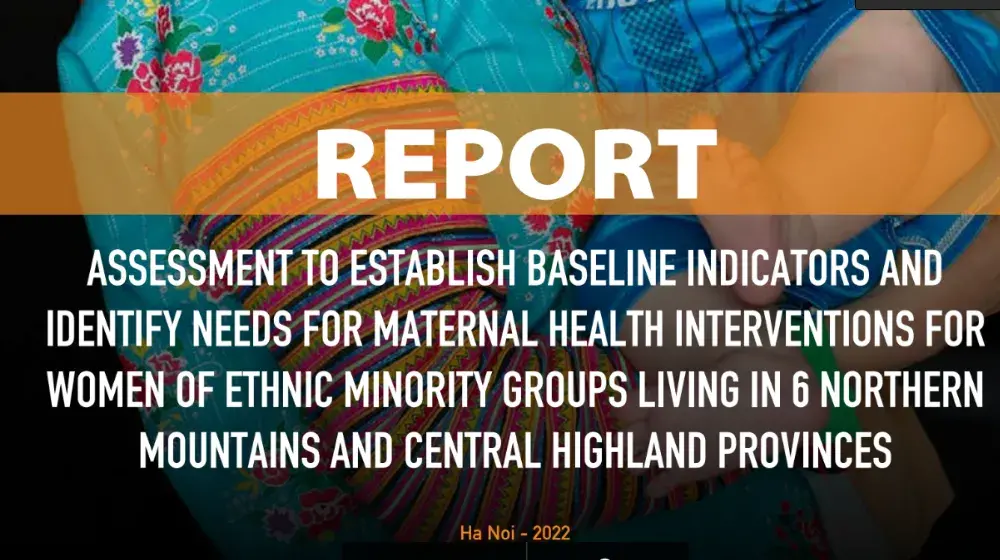Ha Noi, 23 April 2013 – The official role of ethnic minority midwives will be recognized in the Viet Nam's health system when the Ministry of Health's Circular 07 comes into effect in May 2013. This new Circular shows a strong commitment of the Government of Viet Nam in accelerating progress towards achieving the health-related MDGs and saving more women's and children's lives, emphasized the Ministry of Health (MOH) and the United Nations in Viet Nam at the workshop organized today in Ha Noi to launch the MOH's Circular 07 dated 8 March 2013 on requirements, functions and responsibilities of village health workers including village-based ethnic minority midwives.
Chamaléa Thi Thue, 31 years old, Rac Lay ethnic midwife, represented more than 1,000 ethnic minority midwives in 30 provinces throughout the country came to Ha Noi to attend this launching ceremony. In 2007, Thue was sent to a six-month training course for ethnic minority midwives at Ho Chi Minh City’s Tu Du Hospital. This training was initiated by the Tu Du hospital and supported by the international development partners including the UN in Viet Nam to meet mothers' needs and reduce maternal and child mortality rates in remote and mountainous areas.
After the training, she returned to her home village and was determined to apply what she had learnt to her work as a village-based midwife. However, her path to becoming an ethnic minority midwife was as difficult as the road that people from her village in Bac Ai district, Ninh Thuan province - in the south central coastal region of Viet Nam - take to the field each day.
Understanding the language, culture and belief system is key
In remote and mountainous areas where people still live in poverty, it is normal for ethnic minority women to face potential life-threatening complications during pregnancy, delivery or recovery. It was believed by Rac Lay people that like a hen laying eggs, a woman can deliver her baby by herself, so Rac Lay women usually give birth at home or on the farm, assisted by only a mother, mother in law or husband. "Rac Lay people prefer to give birth at home, rather than at hospitals or a health center. We feel shy to deliver at the health care center because there are too many people around," said Thue.
Many ethnic minority people are not aware of the benefits of giving birth in a sterile environment
They often use a knife, a piece of broken ceramic or a bamboo stick to cut the baby's umbilical cord, without any disinfectant. People believe the “forest god” causes maternal or child death. As a result, many tragic deaths are the direct result of poverty and harmful traditional practices. Thue provided check-ups for pregnant women at home or in the farm where the women work. Through these visits, she diagnosed many problems and saved many lives. "At the beginning, many women did not pay attention to my advice. Many women still give birth at home or on the farm without being assisted by skilled midwives. I spent much time with them, talk with them about the benefits of giving birth at the commune health care center. I am happy that I mobilized many women to go to the commune health care center for regular health check-ups and giving births. There are still some women who did not want to go there so I visited them regularly and assisted them when they delivered at home".
Thue recalled one of the complicated cases of an 18 years old woman with breech presentation. After identifying the problem, the woman was transferred to the provincial hospital and her life and her baby were saved. "Now I feel confident providing family planning services, pre and post-natal care and attending normal deliveries. For complicated cases, I know how to refer them to higher levels so they can get the needed care”.
According to Vice Minister of Health Nguyen Viet Tien, the maternal and infant mortality rates in remote and mountainous areas are 3-4 times higher than those in the delta regions. Over 50 percent of women in mountainous provinces give birth at home. He highlighted that the Circular recognizes the official role of village-based ethnic minority midwives in the health system and encourages them to provide maternal and child health care services in remote and mountainous areas where women usually give birth at home.
Understanding the language, the culture and the belief system of an ethnic group is key to gaining trust and encouraging women to receive appropriate health services. The ethnic minority midwives have an essential role in achieving three health-related MDGs 4, 5 and 6, on child survival, reproductive health including maternal health, malaria and HIV/AIDS. "Without trained health workers, especially ethnic minority midwives with midwifery skills, pregnant women and newborns will continue to die needlessly, particularly in mountainous and hard-to-reach areas," said UNFPA Representative a.i Mandeep K. O'Brien at the launch event.
Investing in human resources for health at village level - a highly cost-effective public health strategy
With the official recognition, village-based ethnic minority midwives will be entitled to regular allowances from the State budget. Under the circular, each village midwife will receive a monthly allowance of 0.3-0.5 of the minimum wage set by the State, depending on their localities. Typically, the allowance at present will be VND300,000-500,000 (US$14-$23) a month.
About 1,300 village-based midwives have received training since 1998 by Tu Du hospital. But many of them left the job as they were not officially recognized in the health system, had no official title and no official allowance.
With the new Circular, it is expected that the trained ethnic minority midwives will be recruited to fill the gaps in providing safe motherhood services in remote and mountainous areas. "Investing in human resources for health, especially at village level, is one of the soundest investments a country can make. It is very important to reinforce the status of village health workers, including ethnic minority midwives. If they are empowered to provide the health-care services they are trained to deliver within health systems that include the necessary infrastructure, equipment, drugs, communications and transport networks and comprehensive emergency care, we would not only save many lives, but would also improve the nation’s economic and social productivity. This is a highly cost-effective public health strategy,” emphasized Ms. O'Brien. She also added that empowering the village health workers including the ethnic minority midwives and creating an enabling environment for them is critical so that they can function fully.
On 5 April 2013, the UN and its partners marked the start of the countdown of the last 1,000 days to achieve the MDGs in 2015. The Circular 07 is a great effort in increasing universal access to health care, including reproductive health care services in remote and mountainous areas in Viet Nam. More concerted efforts are needed to speed up the work to save and improve the lives of more women and children.
Click here to watch a video on a story of an ethnic minority midwife in Ninh Thuan province




